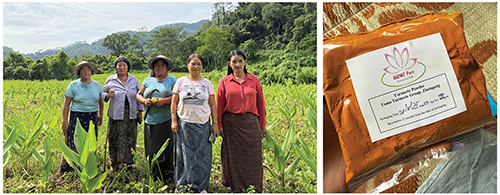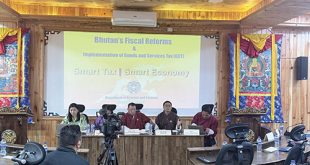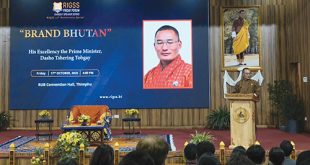Even as Tama’s turmeric farmers in Zhemgang celebrate their growing success, the group of seven women and one man now face a more complex challenge, scaling up their enterprise amid persistent hurdles in labor, mechanization and land.
For years, the group has supplied dried turmeric to Menjong Sorig Pharmaceuticals, becoming one of the few women-led rural enterprises to sustain consistent production since 2017. Yet, beneath the story of growth lies the daily struggle of turning raw turmeric roots into market-ready products, all by hand.
“The peeling process is the hardest part. It takes months to clean and peel, and our hands get cut often. We dry the turmeric in the open sun, and when it rains, we have to move it indoors and use fans. A dryer and slicer machine would make a world of difference,” said the group coordinator, Tshering Lhaden.
Last year, the group achieved their highest yield to date, delivering over 1,000 kilograms of dried turmeric to Menjong Sorig. From each kilogram, they earn Nu 250, generating a total income of over Nu 250,000 a significant boost for the small community.
But the work behind these figures is relentless.
Farmers spend the year alternating between crops, turmeric, paddy, maize, cardamom, ginger, oranges, and vegetables leaving little time for rest.
“As farmers, we cannot depend on one crop to survive. Even adding up all the minutes of rest in a year, we may get only 10 days,” says Karma Choden, a member.
The group initially began with 20 members cultivating cardamom, but when yields failed, they switched to turmeric in 2017 with seedlings and training support from Bhutan Association of Women Entrepreneurs (BAOWE).
Despite their progress, the group faces critical operational bottlenecks.
Without machinery, the turmeric processing from washing and peeling to drying remains slow and labor-intensive, making it difficult to scale up to rising demand levels.
“We sometimes sell 20–30 packets of turmeric powder packed in 100 grams each, earning Nu 40 per packet, mostly to people who know and support us. But this is rare. Without better packaging and equipment, we can’t expand further,” says group coordinator.
BAOWE, which has been the group’s backbone from inception, acknowledges these gaps and has been constantly advocating for mechanization grants and land leasing support to strengthen rural women’s group like Tama’s.
BAOWE is working to transition rural farmers into what it calls Grassroots Rural Entrepreneur Women (GREW). Through its programs, the organization promotes self-help groups, identifies viable crops, and establishes value-addition centres.
Their aim is to prepare women entrepreneurs for the emerging market opportunities such as the Gelephu Mindfulness City project and help rural women scale production, drive down costs, and position themselves as dependable suppliers for the naturally organic global market.
The Zhemgang Dzongkhag Agriculture Sector has also recognized turmeric and ginger as priority cash crops.
Under its Ginger and Turmeric Upscaling Initiative, Nu 1 million has been earmarked for turmeric and Nu 2 million for ginger commercial production in FY 2025–26.
Building on the success of last year’s contract farming initiative with the Kheng Rig Namsum Cooperative (KNC), the dzongkhag plans to expand the model to more farmers.
Turmeric is already being exported to Malaysia through KNC, offering stable market access.
Through contract farming and diversification, the dzongkhag aims to make cash crop production both profitable and sustainable with long-term vision to align Zhemgang’s value chains with the 13th Five Year Plan and national strategies for high-value crops.”
However, while turmeric enjoys relatively stable demand, scaling up requires more than policy intent.
Limited land and manual production processes restrict groups like Tama from meeting larger, standardized market demands particularly those envisioned under future initiatives like the GMC project.
For the Tama turmeric farmers, resilience is both their strength and necessity. The women juggle farm work, family, and processing tasks year-round, with little room for rest. Yet their optimism remains grounded in a shared purpose.
“We have come a long way because of BAOWE’s support. But to move forward, we need machines, better packaging, and more land. Without that, it’s hard to think beyond what we’re already doing,” says the Tama turmeric group coordinator.
The women-led agricultural group have shown they can succeed with the right support. Now, the challenge lies in turning small-scale triumphs into sustainable, scalable models that can anchor the future of rural entrepreneurship.
This article is supported by Bhutan Media Foundation and Helvetas Bhutan, with funding from European Union.
 The Bhutanese Leading the way.
The Bhutanese Leading the way.




